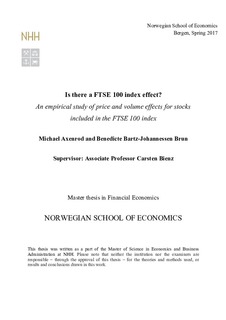| dc.description.abstract | In this study, we examine quarterly inclusions in the FTSE 100 index which should not reveal
new information regarding stock performances. Using the market model, we investigate
returns and trading volume around the announcement and inclusion dates in the period 2005-
2013 for index inclusions. On the day before the effective change of the index composition,
we find a positive and significant abnormal return and abnormal trading volume. The positive
price effect is however reversed the next trading day. Furthermore, we do not find a price and
volume effect close to the announcement date. Our findings are supported by the pricepressure
hypothesis and suggest that the market is not efficient in the semi-strong form. In
addition, we test if there is a higher investor awareness for new constituents compared to
previous constituents, resulting in higher abnormal returns. Our findings suggest that there is
no evidence supporting the awareness hypothesis. Additionally, trading strategies using long
and short positions in the included stocks are presented. | nb_NO |
